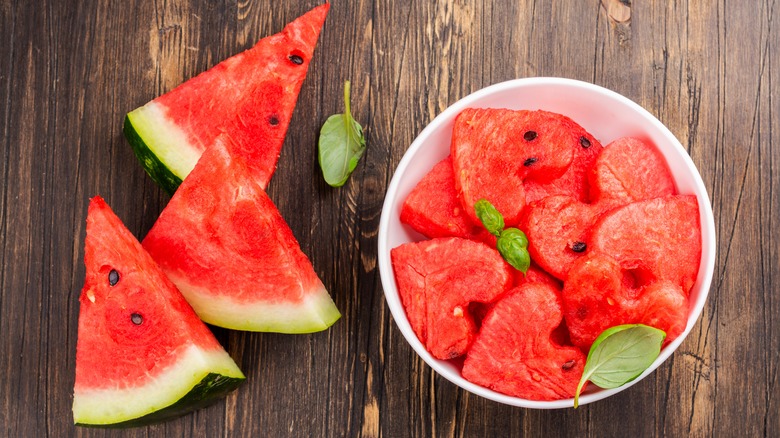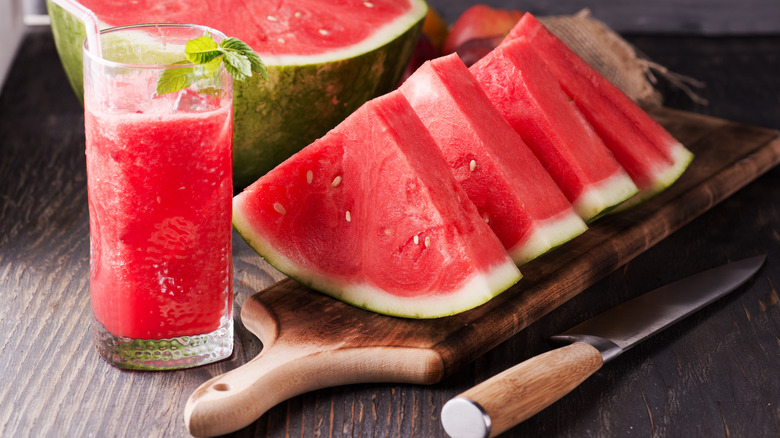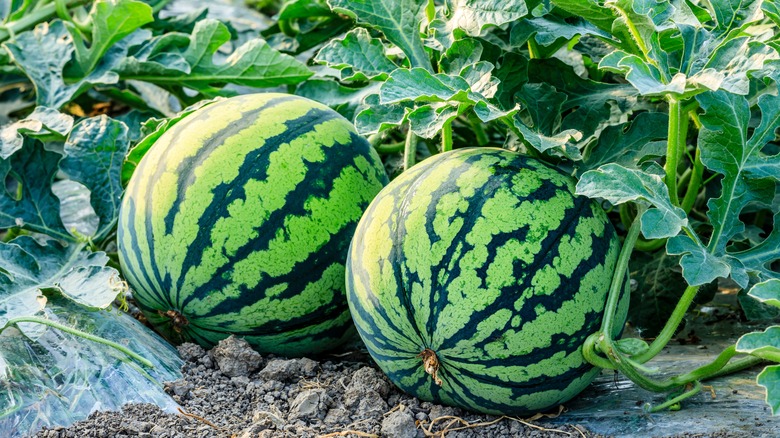How Watermelons Can Be Both Fruits And Vegetables
Oh, the sweet taste of summer. Few treats are as luscious on a hot summer day as an ice-cold slice of watermelon. Though now available year-round, there's something about the sticky juice running down your chin that screams summer fun. Just watch out for the bees the juice can attract.
Despite all their juicy goodness, watermelons have been the subject of an age-old debate. Similar to the squabble over whether tomatoes are considered fruits or vegetables — which in its own right caused enough of a stir in 19th century America that it became a matter for the U.S. Supreme Court (via Find Law) — people can't seem to decide the same when it comes to the perennially popular watermelon.
But what if we told you it was both? And if so, would you have trouble digesting that idea? As is often the case, the facts come down to people not fully understanding what words mean.
What makes a watermelon a fruit?
To understand why watermelons are considered fruits, we must first establish what a fruit is. According to the Encyclopedia Britannica, fruits are a flowering plant's mature ovary (egg). They are produced after fertilization and enclose the plant's seeds. It goes on to say that in popular use, "the term [fruit] is restricted to the ripened ovaries that are sweet and either succulent or pulpy."
Whether you use the encyclopedic or popular definition, it's easy to see that watermelons more than qualify as fruits. Via the University of Wisconsin-La Crosse, we learn they reproduce from male and female flowers, and it's only the fertilized eggs that grow into fruits. Understanding that watermelons fit the popular definition is even easier. One bite into their sweet flesh is all it takes to let you know they are sweet and succulent.
So, if you've been arguing that watermelons are a fruit, congratulations — you're right! But hold on a second. Just because you're correct doesn't mean everyone else has been wrong.
Why are watermelons vegetables?
Now that we've established watermelons are definitely fruits, let's see how they stack up as vegetables. For the sake of making sure we're comparing apples to apples, let's revisit the Encyclopedia Britannica. Here, you'll find vegetables defined as "...fresh edible portions of certain herbaceous plants — roots, stems, leaves, flowers, fruit, or seeds." ScienceDirect shares that herbaceous plants are generally small — growing to a height of less than 1 meter — and have non-woody stems.
Meanwhile, the International Tropical Fruits Network states watermelons belong to the genus Citrullus, all of which are herbaceous plants. That, coupled with the fact that they're edible, makes them a vegetable. See, all the people calling watermelons vegetables also have an entirely valid claim. Watermelons are indeed vegetables despite all their luscious flesh. The devil is in the details, as they say.
If this wasn't enough to make your head swim, consider that many other popular foods are also considered both fruits and vegetables. Business Insider tells us eggplants, string beans, okra, and even corn are technically both fruits and vegetables. Can you imagine biting into a sweet juicy okra pod on a hot summer day?


